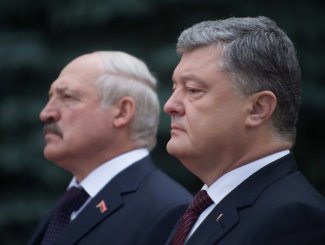Belarusian-Ukrainian co-operation with Russia in the background

On 20–21 July, the Belarusian president, Alyaksandr Lukashenka, made an official visit to Kyiv where he took part in a Belarusian-Ukrainian business forum and then met with the Ukrainian president, Petro Poroshenko. This was Lukashenka’s first official visit to Kyiv in the past four years and the second meeting of the two presidents in 2017. This intensification of top-level contacts is an effect of the two countries’ desire to demonstrate their close co-operation and create more room for manoeuvre in foreign policy. Nevertheless, the two presidents have different priorities regarding bilateral co-operation. In the case of Kyiv, these are security issues; in a statement for the press Poroshenko said that he had been assured by the Belarusian president that Belarusian territory would not be used for any aggressive action against Ukraine. However, Lukashenka did not make such a declaration in public, focusing instead on economic issues; this was conditioned by Minsk’s dependence on Moscow as regards economic and security issues. The visit did not result in any decisions that would mark a milestone in relations between the two countries. The documents signed concerned co-operation in the areas of science and culture.
Ukraine’s goal – security
Alyaksandr Lukashenka’s visit to Ukraine fits in with Kyiv’s activity in foreign policy observed over the past few weeks. On 20 June, Poroshenko went on a visit to the USA where he met with Donald Trump amongst others. He next visited Brussels on 22 June and Paris three days later. In July, Poroshenko met with the prime minister of Moldova and visited Georgia. Close contacts with leaders of post-Soviet countries where enclaves controlled by Russia are located are intended to strengthen Kyiv’s position in Eastern Europe and to cement solidarity in the face of Russia’s aggressive policy. Security issues were a priority during the Poroshenko’s meetings. Relations with Minsk are no different. Kyiv wants above all to prevent a possible attack of Russian troops from Belarusian territory, especially in the context of the Russian-Belarusian military exercises Zapad 2017 scheduled for September. Kyiv is aware of Minsk’s limited sovereignty as regards security policy and has expressed concern on numerous occasions that Moscow may use the exercises as an opportunity to invade Ukraine or permanently increase the presence of Russian troops in Belarus. The conversation with Lukashenka was thus aimed at probing Minsk’s stance and strengthening Belarus’s conviction of the threats this scenario poses to both parties. The fact that Lukashenka did not express clear support for the country’s territorial integrity and made no assurances there was nomilitary threat from Belarusian territory in his statement for the press was thus certainly disappointing to the Ukrainian partner. Generally, Lukashenka’s visit has been evaluated sceptically in Ukraine. The main points of criticism have been: its poor timing (on the first anniversary of death of Pavel Sheremet, a journalist of Belarusian descent who was murdered in Kyiv) and the fact that Lukashenka, an authoritarian president who is in a military alliance with Russia and views NATO as a threat to his own security, was received with the greatest honours.
The export priority in Minsk’s policy
In contrast to the Ukrainian stance, in the case of Belarus, economic co-operation was the main issue on the agenda of the talks. Excessive political support to Kyiv would be too risky for Belarus as it would have posed the threat of confrontation with Russia, which is its military ally, it sole supplier of oil and gas and its main trade and political partner. This is why Minsk does not take a stance on international forums that would contradict Moscow’s interests, as was visible in Lukashenka’s statement during the press conference ending his visit to Kyiv. Belarus has made attempts not to take sides since the very beginning of the Russian-Ukrainian conflict. Contrary to the Kremlin’s expectations, Alyaksandr Lukashenka has not yet officially supported the annexation of Crimea or the aggression in Donbass. Belarus’s cautious stance has been dictated above all by the fear of undermining the territorial integrity of any of the post-Soviet countries and of escalating tension in the region. Furthermore, its carefully weighed policy towards Russian aggression offered a chance to resume dialogue with the West. This is why the Belarusian diplomacy was so eager to use the two rounds of the peace talks held in Minsk in September 2014 and February 2015 to build an image of Belarus as a neutral country capable of acting as an intermediary in achieving peace in the region. However, given its limited room for manoeuvre in political issues, the safest and also the most profitable line of co-operation with Ukraine is on the economy. This in particular concerns exports in which petroleum products have played the main role for years. According to data for 2016, around a third of fuel exports from Belarus (4.3 million tonnes) went to Ukraine, and their share in Ukrainian imports of petrol and diesel oil reached 80% and 50%, respectively. Trade volume between the two countries reached almost US$4 billion, which made Ukraine Belarus’s second largest trade partner, after Russia. The positive trade balance with Ukraine (unlike with trade with Russia) is very important to Belarus; last year it reached US$1.86 billion. Data for the first five months of this year indicate that trade volume has grown by 26%, also to the benefit of Belarusian exporters. In the present situation, the Ukrainian market offers the greatest opportunity for Belarus to decrease Russia’s share in Belarusian exports.
Prospects
The meeting of the presidents of Belarus and Ukraine has laid bare the difference in priorities, which has already been visible for a long time, conditioned by the two countries’ relations with Russia. While Ukraine is de facto at war with Russia, Belarus is engaged in a military alliance and close political and economic co-operation with Moscow. Given these facts, political co-operation between Minsk and Kyiv targeted against Russia can hardly be expected in the near future. At the same time, the governments of Ukraine and Belarus want their co-operation to be enhanced and, most importantly, the situation in Eastern Europe to be stabilised. Regardless of the visible differences in perceiving Russia, the desire to bring peace to the region seems to be the main factor that will cement relations between Kyiv and Minsk.





